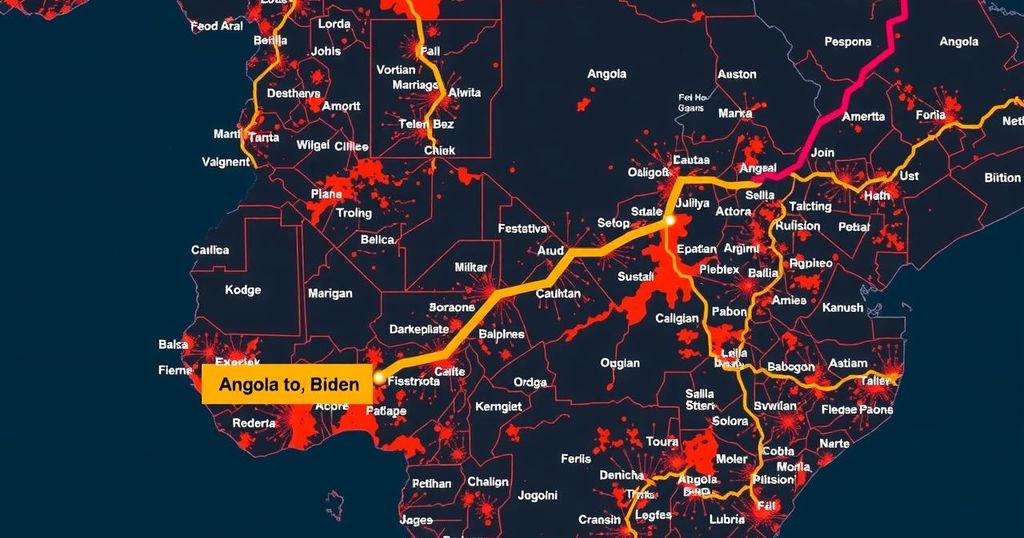President Biden’s upcoming visit to Angola will spotlight the Lobito Corridor, a $5 billion project designed to enhance infrastructure and supply chains in Africa. This initiative is part of a broader strategy to mitigate China’s influence in global development, focusing on vital mineral access and improved economic prospects. The project is backed by the Partnership for Global Infrastructure and Investment, reflecting a significant U.S. commitment to the continent.
In early December, United States President Joe Biden is set to highlight the Lobito Corridor during his visit to Angola, a major infrastructure endeavor aimed at fortifying critical supply chains within Africa. This $5 billion initiative seeks to enhance the 1,300-kilometer Benguela railway, connecting Angola to the Democratic Republic of Congo, and subsequently to Zambia, thus serving as a cornerstone for the Biden administration’s approach to diminishing China’s influence on the continent. The Lobito Corridor project is financed significantly by the Partnership for Global Infrastructure and Investment (PGI), a Biden-launched initiative which evolved from his Build Back Better World effort to present an alternative to China’s Belt and Road Initiative (BRI).
Once operational, the Lobito Corridor promises to enhance availability of vital minerals like cobalt and copper, crucial for electric vehicle manufacturing, while also decreasing transportation costs and driving agricultural development. Currently, a substantial portion of the Democratic Republic of Congo’s copper and rare earth mineral resources is controlled by Chinese enterprises.
Angolan President Joao Lourenco advocates for the project, which comes at a time when Angola’s significant debt to China complicates its economic landscape. Since 2013, China has emerged as a predominant financier of global infrastructure, particularly in Africa, where it has engaged in substantial loan agreements with multiple governments and regional organizations. Amid this backdrop, the PGI intends to mobilize a total of $600 billion by 2027 to provide transparency in financing and promote socially and environmentally responsible initiatives, offering a conceivable avenue for countering China’s economically opaque practices.
The U.S. administration announced its Africa strategy in August 2022, committing to a $55 billion investment over three years, although much of this funding has been allocated under pre-existing programs rather than new mega-projects. Nonetheless, the Lobito Corridor stands out as a beacon of tangible U.S. investment in Africa, allowing recipients to visualize American contributions akin to those prominently undertaken by Chinese investments. As the project progresses, stakeholders stress the importance of incorporating local civil society groups to ensure equitable distribution of benefits derived from this significant infrastructure investment.
The Lobito Corridor is a vital infrastructure project initiated by the Biden administration, aimed at counteracting China’s influence in Africa through strategic investments. The project encompasses the revitalization of the Benguela railway, ultimately connecting Angola with the Democratic Republic of Congo and Zambia. This initiative is not only a part of Biden’s strategy for global infrastructure but also signifies a substantial U.S. commitment to enhance access to critical minerals needed for electric vehicle production. Moreover, it represents a collective effort by G7 nations to mobilize resources in a transparent manner, adhering to environmental and social standards while promoting fair labor practices.
In conclusion, President Biden’s forthcoming visit to Angola underscores a pivotal moment for U.S.-Africa relations with the focus on the Lobito Corridor. This project not only illustrates a strategic pivot to challenge Chinese dominance in infrastructure financing but also aims to foster economic growth and sustainability within the region. As stakeholders advocate for inclusive practices, the success of the Lobito Corridor may very well dictate the future trajectory of American engagement in African development amidst rising global competition.
Original Source: www.voanews.com






